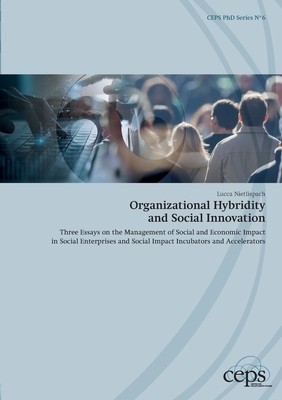
- We will send in 10–14 business days.
- Author: Lucca Nietlispach
- Publisher: BoD - Books on Demand
- ISBN-10: 3759749925
- ISBN-13: 9783759749925
- Format: 14.8 x 21 x 0.5 cm, minkšti viršeliai
- Language: English
- SAVE -10% with code: EXTRA
Reviews
Description
Global societal challenges like food insecurity or the replacement of fossil fuels with renewable energy have no easy and straight-forward solutions. Ultimately, a democratic process and social acceptance of new approaches are just as important as economic efficiency and cost reduction. Besides engagement from the public sector, there are private initiatives that aim to strike this balance. These newer hybrid organizations aim to internalize both social and economic identities and goals. However, this causes challenges that have to be overcome in order to successfully disseminate social innovations. This thesis, composed of three individual essays, investigates this context with a particular focus on social impact incubators and accelerators. These types of private support organizations act as intermediaries in social innovation ecosystems and support social enterprises through bundled services offered in innovation programs that span several months. The first essay is a literature review that takes a closer look at management in social enterprises, because they are the main participants in social impact incubator and accelerator programs. By investigating strategies to manage hybridity, this study contributes to the literature on organizational hybridity. The holistic management framework that was developed extends our knowledge of how social enterprises can concurrently improve in the social and economic goal dimensions. The second essay then investigates interactions between social incubator participants and the program environment. Program participants profit from personal mentoring, as well as access to a network and funding opportunities. However, little was known about how program participants interact and learn in these environments. This thesis contributes to knowledge by providing insights through a longitudinal single case study. In addition, it illuminates how these programs are funded in the third essay. An empirical model was built and tested using dat
EXTRA 10 % discount with code: EXTRA
The promotion ends in 23d.07:06:56
The discount code is valid when purchasing from 10 €. Discounts do not stack.
- Author: Lucca Nietlispach
- Publisher: BoD - Books on Demand
- ISBN-10: 3759749925
- ISBN-13: 9783759749925
- Format: 14.8 x 21 x 0.5 cm, minkšti viršeliai
- Language: English English
Global societal challenges like food insecurity or the replacement of fossil fuels with renewable energy have no easy and straight-forward solutions. Ultimately, a democratic process and social acceptance of new approaches are just as important as economic efficiency and cost reduction. Besides engagement from the public sector, there are private initiatives that aim to strike this balance. These newer hybrid organizations aim to internalize both social and economic identities and goals. However, this causes challenges that have to be overcome in order to successfully disseminate social innovations. This thesis, composed of three individual essays, investigates this context with a particular focus on social impact incubators and accelerators. These types of private support organizations act as intermediaries in social innovation ecosystems and support social enterprises through bundled services offered in innovation programs that span several months. The first essay is a literature review that takes a closer look at management in social enterprises, because they are the main participants in social impact incubator and accelerator programs. By investigating strategies to manage hybridity, this study contributes to the literature on organizational hybridity. The holistic management framework that was developed extends our knowledge of how social enterprises can concurrently improve in the social and economic goal dimensions. The second essay then investigates interactions between social incubator participants and the program environment. Program participants profit from personal mentoring, as well as access to a network and funding opportunities. However, little was known about how program participants interact and learn in these environments. This thesis contributes to knowledge by providing insights through a longitudinal single case study. In addition, it illuminates how these programs are funded in the third essay. An empirical model was built and tested using dat


Reviews